The acquittal comes just days before the Czech presidential elections in which Andrej Babiš is a strong candidate.Continue reading
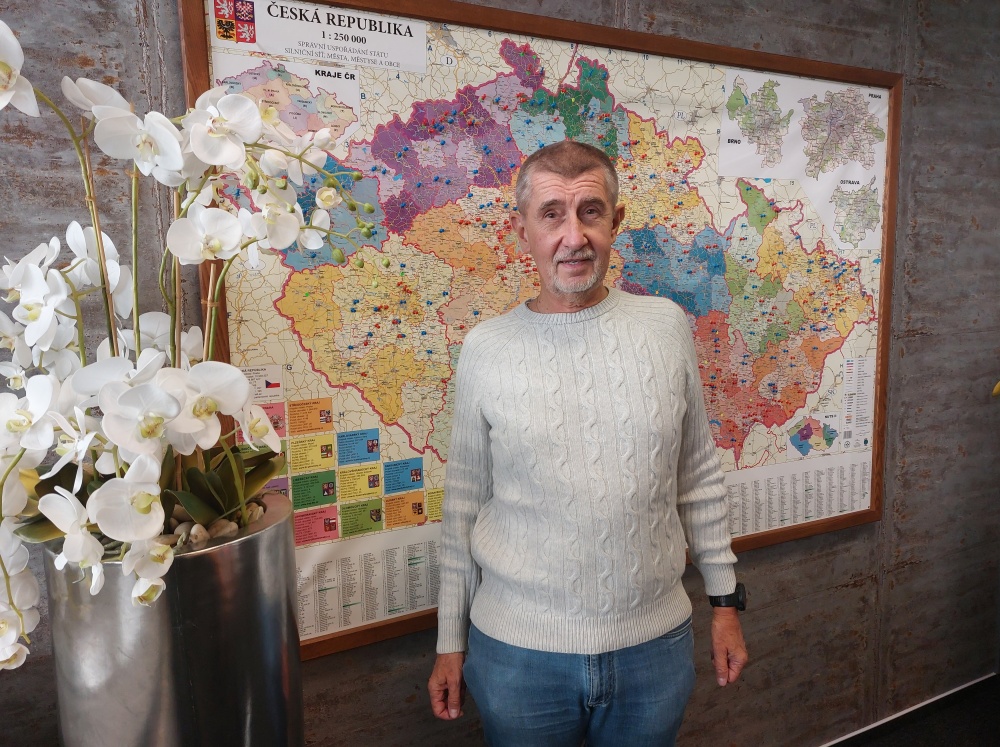
We recently met the former Czech Prime Minister and leader of ANO at his party headquarters in Prague. During our exclusive interview, Andrej Babiš addressed issues concerning election manipulation, the Visegrad 4 alliance, his choice for Commissioner Vera Jourová, and shared his view on the recent meeting between Hungarian Prime Minister Viktor Orbán and Russian President Vladimir Putin.
You were obviously watching the elections in Poland, the contrast between the two Polish leaders is not as sharp as for instance between the leaders of Slovakia’s two largest parties (Robert Fico and Michal Šimečka). Furthermore, the V4 cooperation between Hungary and Poland under Prime Minister Mateusz Morawiecki was not always enthusiastic either. On the other hand, Donald Tusk is not a pro migration politician per se.
We can only hope that the winner of the elections will understand that the Visegrad 4 alliance (Slovakia, Czechia, Poland, Hungary) had achieved huge results, and he will return to this cooperation giving the alliance a chance to function again.
Unfortunately, from the part of the current Czech Prime Minister Petr Fiala, this is not the case, despite the fact that he claims to be a right-wing conservative politician. He has coalition partners who have openly stood up against Hungary, such as Markéta Pekarová Adamová (President of the Chamber of Deputies) or Ivan Bartoš (Minister of Regional Development and Deputy Prime Minister for Digitalization). It is a shame that Fiala allowed this to happen.
Let us look at October 2021, when you lost in the elections. There is one element that might have played just enough of a role for Fiala to gain his winning half percent advantage: the Pandora Papers published by the International Consortium of Investigative Journalists. They came up with the revelation only a week before the Czech elections, presenting basically nothing illegal against you, only highly personal financial matters that made you look “rich” and vulnerable. Do you attribute any significance to this timing and initiative?
Of course, this was the main reason why the Fiala government, composed of five ideologically different parties, had won the election. This certainly was not a coincidence. There was a media campaign directed against me ever since 2012. I have always conducted my business in accordance with our laws, it was my own money that I deposited on said accounts, and there was no question of money laundering. The parliamentary commission’s controls had shown after the elections that there was no illegal activity. But of course, the timing of the revelations four days before the elections were such as to damage my campaign. In the Czech television, the partner of the advisor of the current president had slandered me during the last pre-election debate. The media have exploited all this against me with precise timing. The question is what effect this really had on our campaign, but this had probably resulted in the loss of a few percents.
I have observed that the papers that have been full of Pandora related accusations before the elections have almost completely seized even mentioning the affair the day after the elections. This raises suspicions that they thought it best to disassociate the Petr Fiala win from this artificial scandal. Did your team notice that?
I think anyone who was not totally blind had to notice this. The so-called investigative journalists involved who came up with this hoax promised to reveal 300 names from the Czech Republic, and then they did not reveal anything. This was clearly only a pre-meditated action against me. The timing was no coincidence.
There was a Hungarian version of this, they call it the Pegasus scandal, but the Hungarian electorate seems to have been mostly resistant to this campaign directed by George Soros’ NGOs and newspapers. What do you think made Czech society more vulnerable to such externally orchestrated manipulation?
It is not so much about Czech society but how the media had presented it. This was repeated from morning till evening. There was a concerted campaign in the activist media, as well as the public broadcasters. They are still preoccupied with criticizing us instead of keeping checks on the current government. This has been repeated during the presidential elections. The media have selected the president, and people have voted for him.
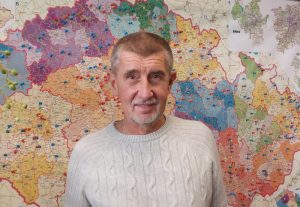
Andrej Babiš. Photo: Hungary Today
Do you think you were the prime target of this campaign personally, or it could have been the V4 cooperation, or were you punished for your friendship with Brussels’ thorn in the side of number one, Viktor Orbán?
I do not think this had much to do with Orbán. This was directed against me, and politicians who have refused to kiss Brussels’s hands, who are still behaving as sovereign leaders of sovereign countries. All this as a result of journalistic activism in the Czech Republic and in Europe.
You have two more years to the next elections- what can you do as the leader of the currently most popular political group in the Czech Republic to make people understand the importance of the V4 alliance, and make them demand their government to reinvigorate it?
There will be European elections next year, this is of course part of our program. Europe’s main problem is illegal migration, which is growing in intensity, and of course the Green Deal, which has a negative effect on industry, companies, and employment. We are much stronger together in the V4, so if this will work on the level of prime ministers, then this alliance will play a significant role when elections for the European Council and Commission will come.
For my party ANO, it is important to win big in the European elections because we want to save Europe from radical green and pro-migration ideologues who are hostile to nation-states. The V4 is about nation-states, but sadly our present government played a key role in dismantling it. Hopefully, after this government is kicked out by voters, the V4 will be an influential force in the EU again.
You are surely following the conflicts within European political fractions, such as Fidesz leaving the EPP, or Slovakia’s SMER, and HLAS being suspended from PES. Many commenters see Damocles’ sword as far as ALDE/Renew and your party ANO are concerned. Do you think that if you continue to favor classical conservative topics, such as anti-migration and anti-Green Deal, you will eventually meet the fate of the above three parties?
No, we do not have a tense relationship with either Renew or ALDE. There is a problem that there are some opposing factions, such as the Hungarian Momentum party and Progressive Slovakia, which are continuously rallying against me and criticizing my participation at the CPAC conference in Budapest.
We are not conservatives, we are a catch-all party, and I only used my participation at the conservative conference in Hungary to make my views on Europe known.
We joined ALDE in 2014, when we did not have precise information about the profile of fractions in the EU. I preferred ALDE because it was a mostly French-speaking grouping, and I speak French well. It is clear that there is some pressure from these parties, but we are communicating with them and I hope things will get back to normal.
Recently you have been explaining the importance of the EU elections a lot, but if the right to veto is abolished, we might end up watching helplessly on the sidelines as the will of Berlin and Paris is steamrolled through the European structures.
I cannot even imagine how this could happen. We continue to insist on some question to include the right of veto. Thanks to the veto we have achieved a number of victories in the past. For instance, in the question of the Green Deal, or when the migration quotas have been rejected.
Hence I cannot imagine that the right to veto would be abolished.
I do not think that even our present government would want that. Our president, Petr Pavel, has had some ideas in this regard, but since he is no expert in these matters, he does not understand what is at stake here.
Yet a few weeks ago in Brussels, EU ambassadors voted in a proposal involving migrant quotas. The Czech Republic had abstained from the vote, even though previously the Czech stance was unequivocally against. It took them 13 minutes to sweep the objections of the Hungarian and Polish sides off the table and force their will on smaller nations. There is a precedent on the rise, do not you think?
Well, of course this was a majority vote, but it was a mistake for the Czechs not to go against the proposal. This stems from the fact that they were inexperienced and they did not think it all through, namely that migrants will not wait for the final decision of the European Parliament before they set out towards our countries. If the Czech Republic says that we take 30,000, and this is heard by a million, then a million will come. This is a grave danger for Europe, and the situation in individual Member States is gradually getting worse.
There is perhaps no one who has done more damage to the EU-Hungarian relationship than Commissioner Věra Jourová. This is probably valid for EU-Polish relations too. What do you think of her behavior in these disputes, do you have regrets that it was your party ANO that served as a launching pad for her to get to her role in Brussels?
The problem is that we wanted a different portfolio in the European Commission, because the portfolio of the commissioner for values and transparency is levitating towards all sorts of declared European values, hence when Ms. Jourová had arrived in Brussels, she had to be there for Europe, not for us.
As far as our voters are concerned, this did not go down well with them, although we are explaining the situation to them. But it all unfortunately ended up so that she came up against both Hungary and Poland.
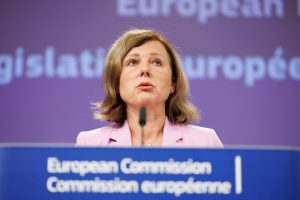
Věra Jourová. Photo: European Commission
Professor James Carafano of the Hoover Institute says that migration cannot be stopped by superpowers, nor trans-national institutions. Migration can only be stopped through the alliance of like-minded nation-states. Do you agree with this?
Global institutions cannot tackle the problem. The cooperation within the V4 was effective, we clearly said that migrant boats should not be allowed out of ports. We must take care of migrants outside the European continent. Our four countries have collected 32 million Euros for the Libyan coast guard to purchase four patrol boats and fight against people smugglers. We must prevent those boats from leaving Africa, everyone who comes to Europe must come legally. Migration is mostly regulated by people smugglers and the situation is becoming untenable. Only Egypt takes action against them.
Unfortunately, Europe is inactive, it did not deal with the issue, even though there were plans to tackle the problem. Now they have come up with the migration pact that we disagreed with, but they still forced it through, and this is going to be a major problem.
Europe should model its migration policy on Australia. It should have its own “Ellis Island” where requests for asylum should be processed.
The EU is unable to come to an agreement, each country tackles migration differently. Whilst Denmark cut down on handouts to migrants, Germany is still very generous and provides migrants with accommodation, food, and a generous monthly allowance. That is why migrants go to Germany. But the answer to illegal migration is to tackle the problem at the source. We must create a Marshall-plan for Syria so that people can return home.
I am not sure that we can still speak merely about “mass migration.” According to a recent poll, 67% of the French believe that there is an ongoing population-replacement in their country. The difference between the two is that mass migration is a spontaneous process when masses of people move from one country to the other in fleeing conflict or in the hope of a better life. In the other case though, we see public debate cancelled, criticism banned, the problems arising swept under the carpet, and an element of organization in which millions of people are forced on indigenous societies against their express will and protests.
Well, it has its history. Especially after the second world war, masses of people were brought in to help reinvigorate European economies. Many of them have stayed on, and certain social tensions have arisen. It is up to individual countries to decide what they want to do with this. We do not want illegal migrants here. Historically, we had our own migrant work-force from Ukraine and Slovakia, but
in terms of the cultural and ethnic profile of these migrants, we do not want to go down the route of Germany, Sweden, or France. There, large ethnic communities were formed with different habits and culture, which had resulted in problems.
In terms of your close ties with the Hungarian Prime Minister, how did your work and friendship with Viktor Orbán shape you as a politician and a person?
Viktor Orbán is the most experienced politician in Europe today. He has won many elections and understands how things work. He had given me valuable advice, for instance, in terms of the European budget, as how to safeguard national interests. We have put all this in practice with Orbán but also with Morawiecki, especially with regard to the Green Deal. This common front with Orbán, Morawiecki, and Peter Pellegrini had worked well, we had shared interests. Morawiecki was more active in working with me on the Green Deal, Orbán focused on migration with my active support. We have coordinated our actions.
Many Hungarians have viewed the Czechs as co-warriors, especially after the successful common front against the migration pact. Now they see a fairly hostile political class in Prague that is openly critical of the Hungarian stance on migration, national sovereignty, gender ideology etc. You have a president who comes to neighboring Slovakia to campaign against PM Orbán. What message would you send to Hungarians who feel that this friendship has been betrayed?
Czechs have certainly not turned against the Hungarians, relations continue to be great. The problems are caused by Czech governmental politicians, and this is a mistake. I do not know why they are doing this. The fact that I have friendly relations with Mr. Orbán, and they have an unfriendly relationship towards me, will have something to do with this.
Hungary is a big investor in the Czech Republic, for instance in Aero Vodochody. Innogy is the largest natural gas distributor. The conflict is caused by some politicians, unfortunately President Petr Pavel has joined them, but Ms. Markéta Pekarová Adamová and Mr. Ivan Bartoš completely senselessly drive this while not even understanding what is going on.
I remember our last V4 meeting in Budapest on December 13th, 2021, where we were joined by Emmanuel Macron, during which we explained to him in talks extending into the night how things work in our countries. We have in the past had totalitarian regimes, so we tried to explain to him how things developed. It is therefore all a matter of communication.
From the part of certain Czech politicians though, there is a concerted effort to generate conflict because they are unhappy with the Orbán-Babiš friendship.
But I am a free person, so I have friendly relations even with Hungarian President Katalin Novák, whom I knew from her years as a state-secretary who had dealt with family policy.
Historically, we have good relations and it is a mistake to disregard this. The same is happening in relation towards the newly forming Slovak government, they do not consider the effects of attacks against my person will eventually have an effect on relations towards neighboring countries. It is basically a matter of inexperience and stupidity.
President Pavel came to Bratislava even before his inauguration and had issued some statements with Slovak President Zuzana Čaputová about their concern regarding the rule-of-law in Hungary. Therefore, the above concerns are hardly a conspiracy theory from the Hungarian part. For instance, the Czech Embassy in Hungary had signed a joint statement in which it raised concerns for the allegedly oppressed “Trans-community” in Hungary. Are not we wasting certain historic opportunities in exchange for cheap gesture politics?
This was of course a mistake, but they are unable to comprehend the importance of the region which had thrived while we were in charge. They are just inexperienced and do not understand relations within the European Union. It is one thing to come up with some declarations, and another when we are sitting around a table and are trying to implement the interests of our countries. This is not good, but fortunately this does not have a strong effect on the relationship between our nations.
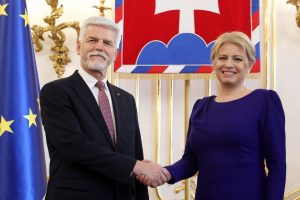
Czech President Petr Pavel (L) with his Slovak counterpart, Zuzana Čaputová. Photo: Twitter Zuzana Čaputová
You have remarked about the recent Orbán-Putin meeting in China, calling it a “misstep.” Yet President Macron did the same thing after the invasion, probably realizing that if Europe does not speak to Putin, then Europe’s geopolitical competitors, such as China, will lead the diplomatic efforts to bring an end to the war in Ukraine. What is your position: turn our back on Putin and arm Ukraine hoping for a resolution through a Ukrainian victory, or should diplomatic channels with Moscow be kept open in case “Plan A” fails?
I understand that this meeting took place on the sidelines of China’s Belt and Road Initiative in Beijing, and that Orbán was dealing with issues important to Hungary. I still feel though that we should coordinate such delicate matters. However, I fully agree that we must strive for peace and bring an end to this senseless war.
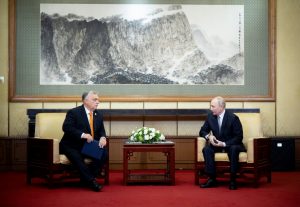
Viktor Orbán (L) during his meeting with Vladimir Putin. Photo: MTI/Miniszterelnöki Sajtóiroda/Fischer Zoltán
One of the most used weapons of the European left against conservative forces is that they try to hypnotize them into believing that they are isolated. Do you feel isolated as someone who often goes against the Czech or even European mainstream?
I do not feel isolated, I do care about Europe’s future and I want to be part of Europe. I am only sorry that Europe has serious problems with the Green Deal, illegal migration, and with the expansion of the Schengen area. It is all going around in circles, and thus Europe is losing on its competitiveness. We have been criticized in the past, but we did have solutions,
there was a strong will to solve disputes to the benefit of Europe. Unfortunately, people in the European Commission are unable to turn words into actions, unable to go all the way until a solution is found.
Featured Photo: Hungary Today